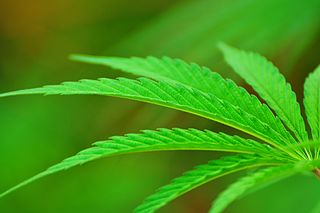Related Research Articles

The legality of cannabis for medical and recreational use varies by country, in terms of its possession, distribution, and cultivation, and how it can be consumed and what medical conditions it can be used for. These policies in most countries are regulated by three United Nations treaties: the 1961 Single Convention on Narcotic Drugs, the 1971 Convention on Psychotropic Substances, and the 1988 Convention Against Illicit Traffic in Narcotic Drugs and Psychotropic Substances. Since its descheduling in 2020, cannabis is classified as a Schedule I drug under the Single Convention treaty, meaning that signatories can allow medical use but that it is considered to be an addictive drug with a serious risk of abuse.

Cannabis in Portugal is decriminalized, as a result of the decriminalization of all drugs in Portugal in 2001. Medical use of cannabis was legalized in 2018.
Cannabis in Madagascar is illegal, but is produced and consumed domestically.

Cannabis in South Africa has been decriminalised by the country's Constitutional Court for personal consumption by adults in private. However, laws prohibiting use outside of one's private dwelling and buying and selling cannabis still remain. Since regulations against the purchase of products containing cannabis still remain in effect, it is unclear how the ruling can be enforced.
Cannabis in Greece is illegal for recreational purposes. In 2017, the Greek government legalized the use of cannabis for medical purposes, and a year later, they lifted the ban on growing or producing it. This enables pharmaceutical companies to grow cannabis legally, and industrial hemp suppliers too.

Cannabis in Pakistan is illegal for recreational use, although since September 2020, extracts of cannabis can be used for industrial and medical use. Cannabis is widely consumed in Pakistan as charas and bhang.
Cannabis in Sri Lanka is legally sold through Ayurveda herbal shops, and can be used for medical and scientific purposes if given a license by the Ministry of Health. For recreational usage cannabis is not legal.
Cannabis in Lesotho is illegal for any use, but largely tolerated. Cannabis is widely produced in the country, being the nation's most significant cash-crop. In the 2000s it was estimated that 70% of the cannabis in South Africa originated in Lesotho. In 2017 Lesotho became the first African nation to grant a license for the cultivation of medical cannabis.
Cannabis in East Timor is illegal.
Cannabis in Jordan is illegal. In 2018, Anwar Tarawneh, Director of the Anti-Narcotics Department (AND) reported that "marijuana is the most consumed drug in Jordan", with the AND seizing 1.5 tonnes of cannabis that year. As Jordan is a signatory to the 1961 United Nations Single Convention on Narcotic Drugs.
Cannabis in Liechtenstein is illegal with severe penalties for the production, sale, and possession of marijuana for medicinal or recreational purposes.
Cannabis in Monaco is illegal. The production, sale, and possession of marijuana for medicinal or recreational purposes being a criminal offense with a penalty of up to one year in jail in addition to a fine of up to €1680. Despite the strong laws, the police and courts are often lenient, letting offenders off with a warning.
Cannabis in Tajikistan is illegal with severe penalties for the production, sale, and possession of marijuana for medicinal or recreational purposes. Punishments include up to five years in prison for possession and capital punishment or 25-year sentence for sale.
Cannabis in Equatorial Guinea is illegal with severe penalties for the production, sale, and possession of marijuana for medicinal or recreational purposes. Despite the illegality, smoking marijuana remains culturally popular among all strata of society, and it was reported in 2000 that no one has been arrested for smoking or dealing cannabis in living memory.
Cannabis in Eritrea is illegal with severe penalties for the production, sale, and possession of marijuana for medicinal or recreational purposes. Offenders are imprisoned up to twelve months and fined up to 50'000 Nkf for possession. Conditions for cultivation in Eritrea are poor.
Cannabis in Haiti is illegal with severe punishments for the production, sale, and possession of marijuana for medicinal or recreational purposes.

Cannabis in Kiribati is illegal with severe punishments for the production, sale, and possession of marijuana for medicinal or recreational purposes. A 2011 survey of young people, found that 6.8% of males and 1.6% of females had ever used cannabis.

Cannabis in the Solomon Islands is illegal for the production, sale, and possession of marijuana for medicinal or recreational purposes. Offenders receive a fine of up to $100,000 or imprisonment of ten years. A 2011 survey of young people, found that 16.1% of males and 11.1% of females had ever used cannabis.
Cannabis in Tuvalu is illegal with severe punishments for the production, sale, and possession of marijuana for medicinal or recreational purposes. Due to the nation's high development index, illegal substance abuse effectively does not exist in Tuvalu and there were no reports of drug-related crimes on Tuvalu in 2019 or 2020.
Cannabis in Kosovo is illegal for both medicinal or recreational purposes. Penalties are defined by Article 269 of the Kosovo Criminal Code, last revised in January 2019. For first-time offenders, possession of illicit substances leads to either a one-year sentence or, more likely, a financial penalty of €250-300. A 2014 survey of 5500 reported that 10% of Kosovans knew someone who had used cannabis and 12.6% reported having easy access to cannabis.
References
- ↑ "Legal status of cannabis in Djibouti - Cannaconnection.com". www.cannaconnection.com. Retrieved 2020-04-18.
- ↑ by. "Cannabis in Djibouti – Laws, Use, and History – The Peace Dealings". Archived from the original on 2021-03-03. Retrieved 2020-04-18.
- 1 2 "Cannabis in Djibouti – Laws, Use, and More Info - Sensi Seeds". Sensi Seeds Blog. Retrieved 2020-04-18.
- ↑ "Drug Trafficking Patterns". www.unodc.org. Retrieved 2020-04-18.